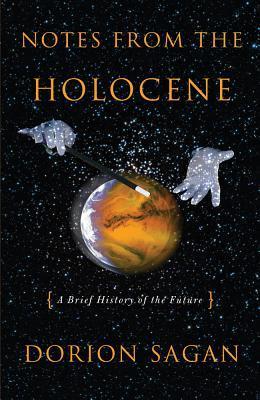Subtitle: A Brief History of the Future. I am trying to figure out exactly why I found this book unsatisfying. I am not sure if the problem was with it or me.
Dorion Sagan, let's get this out of the way early, is the son of the late Carl Sagan. He is also the son of Lynn Margulis, who is credited with being the originator of the idea that mitochondria and chloroplasts began as independent bacteria, and were then absorbed (or invaded) other cells and became organelles. So, lots of good prominent scientist DNA in his makeup.
However, he himself is not a scientist, and it shows in some ways in his writing. One of the things which bugged me was that he was almost never giving details on his sources. For example: "Fully 50 percent of the Nitrogen atoms in your body were recently in a fertilizer factory." Weird, kind of creepy, and an interesting point about how the concept of "me" is somewhat arbitrary. However, is it true? Or is this one of those things, like our bodies being 98% water, that are repeated but not actually true? I don't know, and he doesn't give a source. So this bugged me.
It is more than just a nitpick, because he is aiming at big game, with this book, and if you're after big game you'd better be sure you have your details right. Because, to be sure, Sagan is after Big Game here. By the time he says something like, "...we, despite our finitude, are fractally fixed within an infinite universe", it actually seems to mean something, rather than being word salad. Not sure that I can say what now that I'm NOT reading it any more, but I'm not sure that isn't just my fault, though.
Basically, Sagan seems to be trying to think well and deeply about what science has discovered in the last fifty years about Life, the Universe, and Everything, and put it together into a new and coherent world view. I agree that this is something that needs doing. Some of his imagery, like the repeated use of the phrase "slow green fire" to mean Life, do seem to be worth keeping in mind. One can imagine it kindling, slowly, on a cold gray planet sometime in our past, and then spreading into a great conflagration that consumes everything in its path.
In the end, though, I'm not sure if I know what to do with this book. It may be that you just can't get a satisfying result when you take on topics this far-reaching in just 200 pages. It may be that I'm expecting a tidier and more easily summarized result than I have a right to expect, given the scale of the topic. It may be that this is more or less like what might have happened if Darwin had written "On the Origin of Species" immediately after returning from his journey on the Beagle, instead of spending a couple decades pondering what he had seen, and supplementing it from his own and his correspondents' experience.
It may be that I will buy and read another Dorian Sagan book. But I'm just not sure yet.

